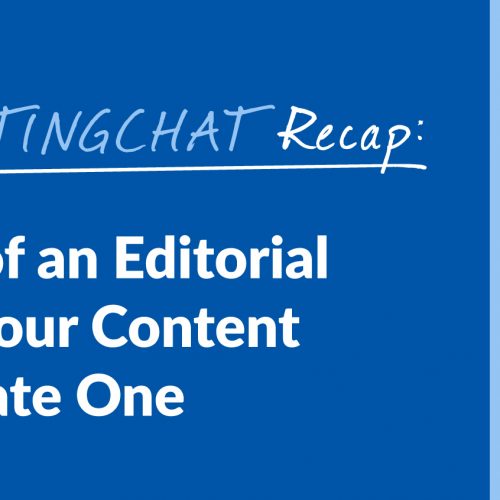#ContentWritingChat Recap: The Benefits of an Editorial Calendar for Your Content & How to Create One with Nathan Ellering
Editorial calendars are an essential part of any content creator’s life. They keep you organized and allow you to strategically plan your content (whether that’s blog posts, videos, social media content, etc.) for maximum results. In this week’s #ContentWritingChat, we talked all about the benefits of having an editorial calendar, plus a few tips on how to create one of your own. If you missed the chat, there’s no need to worry because we have a recap that’s filled with amazing tips. Let’s dive in! #ContentWritingChat Recap: The Benefits of an Editorial Calendar for Your Content & How to Create One with Nathan Ellering Join us for #ContentWritingChat on Tuesday, February 21st with @njellering from @CoSchedule! pic.twitter.com/XPRABeY6Tb — Express Writers (@ExpWriters) February 14, 2017 Our guest host this week was Nathan Ellering. Nathan is a strategist, a content marketer, and a blogger. He’s also part of the CoSchedule team, making him a great fit for this week’s chat on editorial calendars. CoSchedule is a go-to app for planning your marketing, blog, and social media content, so we were thrilled to have Nathan with us to share his best tips! Q1: What is an editorial calendar and why are they beneficial for content creators? To kick things off, we asked our audience to describe what an editorial calendar is. We also wanted to hear why they felt having an editorial calendar was beneficial to their content creation. Here’s what some of the participants in Tuesday’s chat had to say: A1 Editorial calendars help you see everything you’re working on in 1 place! They save time and reduce stress. ? #ContentWritingChat — Nathan Ellering (@njellering) February 21, 2017 As Nathan said, having an editorial calendar allows you to see all of your planned content in one place. It can help save you time and reduce stress when everything is planned out and displayed in a neat way. A1: An editorial calendar is one you create to lay out content marketing strategies–including writing, promotion, etc #ContentWritingChat https://t.co/6RvgOWERr7 — ThinkSEM (@ThinkSEM) February 21, 2017 An editorial calendar allows you to plan out your content marketing strategies. You can organize any written content, promotional material that’s going out, etc. A1 Ed cals are part of an overall content strategy and help to plan content that helps reach overall goals. #contentwritingchat — Cristy (@lacristysalinas) February 21, 2017 Cristy knows it’s important to create content that helps you reach your overall goals. Having an editorial calendar is very helpful for this because you can take the time to be strategic about the content you’re creating. A1 An Ed Cal is a content plan that maps out your campaigns, etc. & helps prioritize. Should be accessible by everyone. #contentwritingchat — Michelle (@michelletweet) February 21, 2017 You should also use your editorial calendar to map out the campaigns you’re running, as well as any other content you’re creating. As Michelle said, it needs to be accessible by everyone. If you have others on your team who are involved in content, they need access to your calendar. A1b: When you plan your content in advance, it eliminates the last-minute stress of coming up with ideas. #ContentWritingChat pic.twitter.com/UrahNdRPMI — Rachel (@redheadrachel) February 21, 2017 And when you’ve planned in advance, it eliminates that stress of having to come up with ideas at the last-minute. Q2: What kinds of content should someone plan using an editorial calendar? So, now that you know what an editorial calendar is and how it can benefit you, what should you plan? Check out this advice from the chat: A2 Plan all marketing projects with your editorial calendar to stay organized! Social media, blog posts, email, etc. #ContentWritingChat — Nathan Ellering (@njellering) February 21, 2017 Nathan’s advice is to plan all of your marketing projects with your editorial calendar. He recommends planning out your social media content, blog posts, email newsletters, and more. There’s no reason not to plan all the content you’re creating in order to stay organized. A2 blog posts, social media posts, projects, basically every piece of content you create. #ContentWritingChat pic.twitter.com/aKIOeDXqqS — Savannah Shea?Blake (@Vannasana) February 21, 2017 Savannah encourages you to plan everything with your editorial calendar! We happen to agree with her. It’s the best way to stay on track with all of your content creation. A2: All content, but especially time-sensitive content. Think content relating to events and holidays! #ContentWritingChat — Mallie Rust (@malliefe2o3) February 21, 2017 Mallie knows that it’s essential to use your editorial calendar as an opportunity to create content around events and holidays. These are key times for content creation and you’ll need to plan in advance if you want to share something great. A2 All the content you want to be effective. Be flexible for emergencies, but strategy is what makes content, marketing. #ContentWritingChat pic.twitter.com/ZlrunhUKPJ — Lex (@estherproject) February 21, 2017 As Lex mentioned, don’t forget to be flexible when planning. If something comes up at the last minute and you want to create a piece of content around it, that’s fine. Be willing to adapt when it comes to the latest news, feedback from your audience, etc. Q3: How far in advance would you recommend someone plan their content with an editorial calendar? Is it possible to plan content too far in advance? Is there a sweet spot for planning? Based on the answers we received, it seems like everyone has their own preference! Check out these responses: A3: Plan high level 6 months out, plot ideas for 3 months out, aim to have 100% content complete for 1 month out. #ContentWritingChat — Nathan Ellering (@njellering) February 21, 2017 Nathan has a very effective plan in place for his editorial calendar. He recommends planning high-level stuff six months out, plotting ideas three months out, and then aiming to have all of your content completed for one month out. It may sound like a lot, but it’s a great way to organize your entire content creation process. A3: Depends on the business goals; in … Read more

